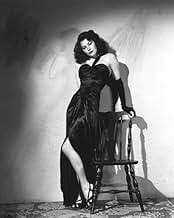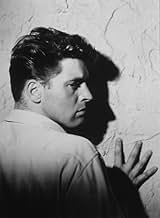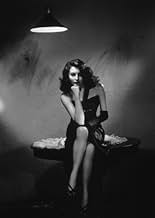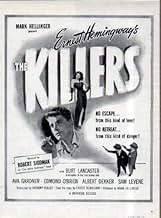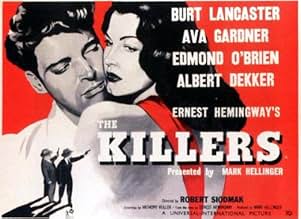Hit men arrive in a small New Jersey town to kill an unresisting victim, and insurance investigator Reardon uncovers his past involvement with beautiful, deadly Kitty Collins.Hit men arrive in a small New Jersey town to kill an unresisting victim, and insurance investigator Reardon uncovers his past involvement with beautiful, deadly Kitty Collins.Hit men arrive in a small New Jersey town to kill an unresisting victim, and insurance investigator Reardon uncovers his past involvement with beautiful, deadly Kitty Collins.
- Nominated for 4 Oscars
- 4 wins & 4 nominations total
- Hood with Cane
- (uncredited)
- Assistant Paymaster
- (uncredited)
- Jail Ward Doctor
- (uncredited)
- Fight Spectator
- (uncredited)
- Party Guest
- (uncredited)
Featured reviews
'The Killers' opens with a thrilling prologue that sees two hired thugs (William Conrad and B-noir stalwart Charles McGraw) harass the patrons at a small-town diner on their way to assassinate Swede Andersen. The characters' quickfire exchange of dialogue resembles something that Tarantino or the Coen brothers would have written decades later, only better, because screenwriter Anthony Veiller (with Richard Brooks and John Huston) reproduces the conversation from Hemingway's short story almost verbatim. After Andersen is unresistingly gunned down in his bed, the screenplay then expands upon the foundations laid down by the source material, using flashbacks to fill in the empty spaces at which Hemingway had only hinted. Veiller, whose work before WWII was dominated by romantic dramas, comedies and light mysteries like 'The Ex-Mrs. Bradford (1936),' appears to have been hardened by his work on Frank Capra's "Why We Fight" propaganda series, and the dark, cynical post-War tone he brings to Swede's tragic story is an ideal representation of the noir spirit.
Burt Lancaster shows promise in his screen debut, though the film's narrative structure does keep the audience distant from his character, an issue that Welles somehow avoided in 'Citizen Kane.' As the resident femme fatale, Ava Gardner never quite inspires the collective hatred garnered by Barbara Stanwyck in 'Double Indemnity (1944)' or Jane Greer in 'Out of the Past (1947),' but perhaps that speaks to her charms – that, despite her betrayal, we're still unwilling to treat her with due contempt. Good-guy Edmond O'Brien cheerfully and voyeuristically experiences the wretched life of a gangster through the intermediary flashback device – he ends the film with a cocky grin, like an audience-member emerging from a screening of the latest gangster thriller. Throughout this review, I've been making allusions to 'Citizen Kane,' but there's a very important difference between the two main characters: Charles Foster Kane had all the money in the world and got nothing out of it. Swede Andersen wasn't even that lucky; he didn't even get the money.
Perfectly directed by Siodmark because it is washed with a moody ambiance that befits the script, the main players in the piece are bang on form to realise the mood and sombre tempo that makes the film a winner. The story basically revolves around Burt Lancaster's Swede Anderson who upon learning that hired killers are out to fulfil a contract on him, promptly stays horizontal on his bed and awaits his fate. We then follow Edmond O'Brien's insurance investigator Jim Reardon as (thru a series of flashbacks) he reconstructs Swede's life and what caused his demise.
The story encompasses one of film noir's most well known femme fatales in Ava Gardner's foxy Kitty Collins, and it's certainly the film's driving force as we observe her part in Swede's life, for better or worse as it were, but ultimately it's the classy framing of the film that marks it out as essential viewing. It's oppressive, it's almost stifling, and it's certainly story telling of the highest order, but mainly it just looks so fecking gorgeous you feel privileged to have been part of it. 9/10
Also, get a load of that opening scene—a midnight diner, shadowy figures, an empty street. Noir seldom comes any purer. All that's missing is a lonely train whistle. In fact, I'll take that extended scene as the movie's best. McGraw and Conrad drop enough tough talk on the poor counterman to drown the average fall guy. It's from that tense 15-minutes that the movie gets what grit it has. The story's remainder is more like a metaphysical puzzle, as Reardon tries to piece together a solution to Swede's mysterious death. Trouble is he's got to rely on second-hand sources since Swede's in no condition to talk. Plus the sources from his past are disconnected in the telling, so it's like trying to figure out a jigsaw. Then too, will the pieces all fit since somebody could be lying—maybe the squinty Dumb-Dumb or the cringing Charleston, or even the curiously laid-back Colfax (Dekker).
This is a narrative you have to think about once it's over. Because, like a highway under construction, there're a lot of twists and turns. Curiously, the main part is largely devoid of action or even much violence. Instead, the writers and director Siodmak settle for atmospheric exposition, and I'm not sure if that helps or hinders. But either way, the unraveling is compelling. Then too, that final scene on the staircase is oddly reminiscent— in this case, Mary Astor's elevator going down at the end of The Maltese Falcon (1941) despite her emotional pleas.
Anyway, 40's noir hardly comes any purer, from spider woman to fall guy to $50 lighting bill. So if you don't mind a complex plot-line, this is one to catch.
Did you know
- TriviaFilm debut of Burt Lancaster. Although this was his first film--at 33 years of age--he received top billing.
- GoofsIn the jailhouse, Charleston (Vince Barnett) tells The Swede (Burt Lancaster) of his love for the stars. As he looks out the window, he says that he says he sees Orion and a prominent star, Betelgeuse. He says that Orion is the "Great Bear" and that Betelgeuse is the "brightest star in the sky". Orion is actually The Hunter. Ursa Major (containing the Big Dipper) is the Great Bear. Betelgeuse, while quite bright, is the 10th brightest star.
- Quotes
[last lines]
[after Reardon has wrapped up the investigation, Kenyon congratulates him]
R.S. Kenyon: Owing to your splendid efforts the basic rate of The Atlantic Casualty Company - as of 1947 - will probably drop one-tenth of a cent.
[he shakes Reardon's hand]
R.S. Kenyon: Congratulations, Mr. Reardon.
Jim Reardon: I'd rather have a night's sleep.
R.S. Kenyon: Why don't you take a good rest. I must say you've earned it.
[Reardon starts to leave]
R.S. Kenyon: This is Friday... don't come in 'til Monday.
Jim Reardon: Thanks.
- ConnectionsEdited into Les cadavres ne portent pas de costard (1982)
- SoundtracksThe More I Know of Love
(1946)
Music by Miklós Rózsa
Lyrics Jack Brooks
Performed by Ava Gardner (uncredited)
Details
- Release date
- Country of origin
- Official site
- Language
- Also known as
- Los asesinos
- Filming locations
- Production companies
- See more company credits at IMDbPro
Box office
- Gross worldwide
- $58,222
- Runtime1 hour 43 minutes
- Color
- Aspect ratio
- 1.37 : 1
Contribute to this page




